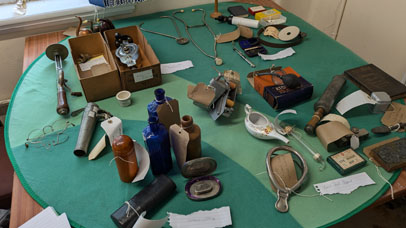Institute for Precision Health
Innovation through collaboration
 Bringing together interdisciplinary teams is key to providing novel approaches that address challenges across the health and life sciences sector. The Institute for Precision Health brings together the collective creativity from the life sciences, medicine, engineering, computing and mathematics, arts and humanities, the business school and commercial enterprise to solve real-world problems that impact on health, well-being and research integrity.
Bringing together interdisciplinary teams is key to providing novel approaches that address challenges across the health and life sciences sector. The Institute for Precision Health brings together the collective creativity from the life sciences, medicine, engineering, computing and mathematics, arts and humanities, the business school and commercial enterprise to solve real-world problems that impact on health, well-being and research integrity.
Only Good Antibodies (OGA) community
Antibodies are a fundamental tool used in biology and basic biomedical research, but the reproducibility of research findings are dependent on how well the antibodies perform. The OGA team have shown that many publications rely on poorly selective antibodies, which contributes to the reproducibility crisis in biological research and the associated large financial waste and ethical impacts. In partnership with YCharOS the team are changing the narrative around reproducible research.
The Only Good Antibodies community was developed and championed by Early Career Researchers Drs Harvinder Virk, Michael Biddle, Panayiota Stylianou and Adam Wright, and we are delighted to be able to support this important initiative through IAA funding and LD3s very talented Carolyn Jones.
Outreach workshops led by Dr Nibedita Ray-Bennett: Avoidable snake bite deaths

Funded by the Institute for Precision Health’s Health Outreach Fund, Dr Nibedita Ray-Bennett in collaboration with Orissa State Volunteers Social Workers Association (OSVSWA) and the Indian Council of Medical Research- Regional Research Medical Centre (ICMR-RMRC) conducted three outreach workshops from 15 to 18 March 2024 in Ganjam District, Odisha/India.
The aims of these workshops were:
 To disseminate the findings of the LIAS and IEF-
To disseminate the findings of the LIAS and IEF-
funded Avoidable Snakebite Deaths in India with high-risk groups (women, farm workers and herders)- To explore the Local-Level Action Network (LAN) model for and with high-risk groups.
The outreach workshops were conducted in three Gram Panchayats of Ganjam District, viz., Burujhari, Su Mondol and S. Chachina. 127 people from 13 villages attended these workshops. Of which 75 were women and 52 were men.
The workshops were delivered in two parts. The first part assessed the level of knowledge and awareness of snakes, snakebites and snakebite deaths through five questions related to myths and six questions related to misconceptions. The data for the myths and misconceptions were curated from the Avoidable Snakebite Deaths in India project. A pre and post-knowledge survey was conducted. The findings of the post-survey revealed that all the participants from three workshops scored 100% in increasing their level of knowledge and awareness on snakes, snakebites and snakebite deaths reduction. In the latter part of the workshop, Dr Ray-Bennett mobilised 21 community ambassadors or dooto for LAN or Sthaniyo Kormo Solanjhojona (SKS).
From 10 to 13 April 2024, these ambassadors were oriented on how to prevent snakebites and snakebite deaths through information, education, and communication (IEC) and behaviour change communication (BCC) materials. The community ambassadors are currently disseminating the IEC and BCC materials through home visits and community meetings across 13 villages.
The Creative Health Network
The Creative Health Network is a new interdisciplinary network and part of the University of Leicester’s Heritage Hub, which aims to promote interdisciplinary, community-based collaborations for Creative Heath, and share research resources across the region to directly benefit the health and wellbeing of individuals and communities through the arts, creativity and culture. It will foster a membership of researchers, community and civic partners, patient groups, health professionals, arts organisations and creative practitioners with a shared interest in creative health and creative approaches to tackling health inequalities.
In its first year, 2024-2025, the Network has three remits:
- To facilitate cross-disciplinary collaboration for research innovation across the University through in-person and online events and networking;
- To collate and share opportunities for researchers and community partners;
- To support research, pedagogical and enterprise initiatives focused on Creative Health.
For further information and to join the network: heritageuol@leicester.ac.uk and Nuala.morse@leicester.ac.uk
The Institute is delighted to support the Creative Health Network through project funding to Dr Nuala Morse in the School of Museum studies. This was an interdisciplinary project with Sallie Varnam (Senior Manager Creative Health and Heritage, UHL) exploring how medical museum objects from University Hospitals of Leicester (UHL) NHS Trust collection could engage patients and staff across hospital sites. Object handling cases, activity resource packs and exhibitions are being developed to support UHL staff and volunteers to deliver a range of creative activity on the wards to promote well-being as part of the hospital’s creative health programming.